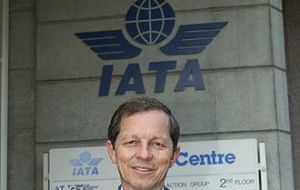MercoPress. South Atlantic News Agency
Airlines posted to loose USD 9.3 billion in 2008/09
 Giovanni Bisignani, IATA's Director General and CEO
Giovanni Bisignani, IATA's Director General and CEO The global airline industry is expected to post losses of 5.2 billion US dollars this year and another 4.1 billion in 2009, according to the International Air Transport Association (IATA). This year's losses are based on an average crude oil price of 113 US dollars per barrel and 140 US dollars for jet fuel.
The global airline industry is expected to post losses of 5.2 billion US dollars this year and another 4.1 billion in 2009, according to the International Air Transport Association (IATA). This year's losses are based on an average crude oil price of 113 US dollars per barrel and 140 US dollars for jet fuel. "The situation remains bleak. The toxic combination of high oil prices and falling demand continues to poison the industry's profitability. We expect losses of US$5.2 billion this year" said Giovanni Bisignani, IATA's Director General and CEO. "While there has been some relief in the oil price in recent months, the year-to-date average is US$113 per barrel. That's US$40 per barrel more than the US$73 per barrel average for 2007, pushing the industry fuel bill up by US$50 billion to an expected US$186 billion this year," said Bisignani. Fuel is expected to rise to 36% of operating costs, up from 13% in 2002. IATA also announced industry traffic data for July which showed a continued slowing of demand. July year-on-year passenger demand growth fell to 1.9% - the lowest in five years. Capacity increased by double that - 3.8% - indicating that service cuts are not keeping pace with the fall in demand. This pushed the load factor for the month to 79.9%, a drop of more than 1% compared to July 2007. The surprise of July was a 0.5% drop in passenger demand by Asia-Pacific carriers partly attributable to a change in Chinese visa requirements but also showing that economic weakness is spreading to previously robust economies. Cargo demand in July contracted by 1.9% compared to 2007. Asia-Pacific carriers - the largest players in the cargo market - were hit hard with a 6.5% drop in demand. As a result of the weaker economic outlook, IATA significantly revised downward its traffic forecast for domestic and international markets combined. Passenger traffic is now expected to grow on average by 3.2% (was 3.9%) and air freight volumes by just 1.8% (was 3.9%). This is only half the pace of expansion seen in 2007 and is boosted by the stronger growth seen at the start of the year. Strong traffic growth allowed the industry to partly absorb the rise in fuel costs from 2003-2007. This is no longer the case. IATA also announced its initial outlook for 2009. The difficult business environment is expected to continue. Most economies are expected to deliver even weaker economic growth next year, which will negatively impact air travel and freight. With an expected oil price of US$110 per barrel (US$136 for jet fuel) and continued weak growth (2.9% tkp), industry losses are expected to continue at US$4.1 billion. The 2009 fuel bill is expected to rise as hedging offers less protection, to US$223 billion comprising 40% of operating expenses.




Top Comments
Disclaimer & comment rulesCommenting for this story is now closed.
If you have a Facebook account, become a fan and comment on our Facebook Page!